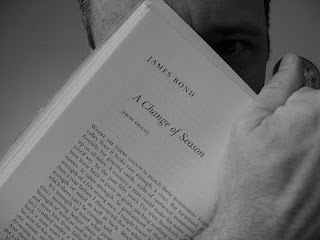
I've been waiting a long time to write this.
I have had a real strange relationship with “The Best American Short Stories” 1982.
First, I should start of and admit that I had more than just a casual interest in John Gardner.
Before I even picked up 1982, Gardner interested me.
His introduction pulled me in. The fact that he was going to exclude “New Yorker” type of stories and give me some real meat – excited me.
What caused me some worry was his admission that the selection was made by several people – not just him, and that he had done it in haste. I was worried because sometimes when people are on a deadline, they get sloppy...or lazy.
Well, I think there was some sloppiness here. There were 20 stories in this anthology. Five of those stories were “Gardner People” – and I think that Oates could be considered number 6 because of their friendship.
Here is where he stacked them – and if you are interested in seeing the relationship the author and Gardner shared, I invite you to read the posts I made on each.
Raymond Carver – First position
Joanna Higgins – Third position
Charles Johnson – Sixth position
Joyce Renwick – Eighth position
Roberta Gupta – Tenth position
Oates??? – Twentith position
So, we see that the first half of the book – ½ of the ten stories – have a pretty clear connection to Gardner. Not one of the authors (excluding Oates) after Gupta had any relationship with Gardner that I could discover.
I’d also like to point out again that the order of the stories is not alphabetical. I would assume that Gardner “requested” that the stories be placed in this order. Perhaps he felt that readers would at least make it through the first half of the book before abandoning it therefore guaranteeing that his people would be read.
So – is there something “wrong” with a literary heavyweight like Gardner stacking his “people” towards the front of the book?
The casual reader in 1982 would have no idea of the relationship that Gardner had with these 6 authors. It is only now, today, that I was able to draw the connections that I did.
I wouldn’t doubt that there were others in the American/New York literary community that knew of the relationships. I’m sure Ravenel knew of the relationships.
Did Ravenel abandon any sort of conflict with Gardner due to deadline? Did she not fight him because she knew that engaging him would be a bloody battle?
I do wish to find out the answer to this...someday.
Personally, I get a dirty feeling knowing that Gardner put his people up front.
If I were an author and I had a relationship with another author who had the reputation and influence as Gardner had, would I want him to place my work just as he did for these authors?
-Yes.
-Simple enough.
So, why do I feel bad about what he did?
Well, I fall back again on that feeling of sloppiness and laziness that I mentioned above.
I just wish that he invested the time and energy that he put into his other efforts – into this book.
Gardner was always looking to help out his friends.
It looks like he did just that before he died.
I have no doubt the authors that were “Gardner People” included in this anthology would have been successful without being included here.
At least that what I tell myself. At least that’s what I hope.
It would be giving Gardner a bit too much power.
Gardener died in September of 1982. He laid his Harley down on a familiar road in Pennsylvania.
The first reviews of “The Best American Short Stories” 1982 were published in November and October of that same year. It was said that the selections he made was one of the last literary works he “produced”.
I like Gardner – but I don’t like what he did in BASS 1982. I do like the stories he picked...but I don’t like knowing the back story behind the authors.
Overall, I really enjoyed this anthology. If you look at the time I have spent with it, it is clear that I don’t want to part with him.
I won’t have the same relationship I’ve had with him over these weeks.
Here are some numbers.
I posted my first entry about the collection on February 25.
I am post my last on April 16.
That works out to the following:
1 month 22 days
or
7 weeks 1 day
or
50 days
or
1,200 hours.
There were 20 stories and that works out to one story every 2.5 days.
Gender split was 10 male and 10 female – hummm...suspicious.
Magazine representation – completely opposite from the last BASS – Only one story from The New Yorker - Two selections from MSS (Gardner’s Magazine) and the rest of the stories are from a nice wide variety of little magazines.
My favorite – “Dancing Ducks”
Least Favorite – tough because I really liked them all - but if forced to choose, “Exchange Value”.
I’ll hold on to John Gardner a little longer.
I borrowed the book “The Art of Fiction” and am currently reading “Conversations with John Gardner” (yea!!! Inter-library loan).
Well- so long – I'll miss you.

















